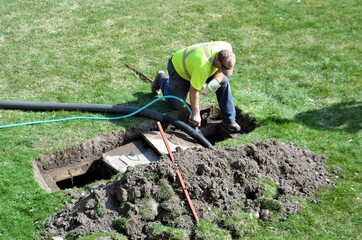Keeping your septic system well-maintained with regular septic tank pumping is the best way to avoid serious problems like clogs, sewage backups and system damage. A comprehensive maintenance schedule is also a selling point for your property. Contact The Septic Guys for professional help. 
When wastewater flows into a septic tank, solid waste sinks to the bottom while oil, grease and water floats to the top. This sludge is then discharged into the drain field to be filtered by soil and microorganisms.
Septic tanks are a crucial part of the home’s plumbing system. They work to effectively drain wastewater into the septic field for treatment, but they can’t function properly if waste builds up and causes clogs or backups. The key to avoiding these nasty situations is preventative maintenance, including frequent inspections and cleanings as well as regular septic tank pumping.
The frequency of cleaning and pumping will vary according to a number of factors, such as household size, water usage, and tank size. Larger households create more waste, which fills the tank more quickly and requires more frequent pumping. Water usage can also cause the tank to overflow, which can lead to a septic system failure and expensive repairs. Avoiding non-biodegradable materials, using septic-safe products, and limiting water use can lighten the load on your septic system.
Professional cleaning and pumping services help reduce the risk of clogs, backups, and other issues that can cause costly damage to your home and yard. During the cleaning process, a technician will dislodge solidified sludge with high-powered equipment and remove it from your septic tank and other system components.
While septic tank cleaning focuses on internal tank rejuvenation, pumping is like hitting the reset button for your entire septic system. It involves evacuating all of the liquid and solid waste that has built up over decades of inbound wastewater flows.
As the waste enters your septic tank, natural bacteria feed on it and break it down into a sludge at the bottom of the tank. Grease floats to the top of the tank and becomes a sludgy substance. Liquid waste, or effluent, exits the tank through a series of pipes into a septic drain field prepared with gravel and other aggregates that allow wastewater to slowly drain down into underground aquifers for purification.
While chemical treatments are often marketed as a quick fix for septic system problems, these chemicals actually kill the beneficial bacteria that break down waste and can clog your septic tank and leach fields. They can also corrode your tank and contaminate groundwater supplies.
Prevents Environmental Contamination
Having your septic tank pumped regularly can help prevent environmental contamination. The septic tank works to sort household waste, with solids sinking to the bottom and fats and oils floating to the top. The septic tank also anaerobically breaks down these solids to produce a liquid effluent that is released into the drain field for further breakdown and filtration by the soil. Over time, these solids can build up to the point where they clog the absorption trenches, resulting in wastewater backups and environmental contamination. Septic tank pumping keeps these solids from reaching this critical stage, reducing the risk of expensive problems and repairs.
The size of a home’s septic tank plays an important role in how often it needs to be pumped. Larger tanks can hold more waste before they need to be emptied, which reduces the frequency of service and saves homeowners money in the long run. The number of people living in a home also plays an important role in determining how quickly a septic tank fills up. Homes with multiple toilets and garbage disposals can use more water than those with only one toilet, leading to higher volumes of waste and quicker tank fill-up.
Septic tank pumping is a professional task that requires specialized equipment and expertise to safely remove and transport the waste. The first step of the process involves locating the septic tank, which is typically located underground and can be identified by its access covers or lids. Once the tank is located, a technician uses a special vacuum system to suck out the sludge, scum, and liquid waste, transferring it to a truck for safe disposal at a certified treatment facility.
Once the septic tank has been pumped, it is important to conserve water usage until the system stabilizes. This will ensure that the newly deposited waste does not get back into the drain field and cause a costly and inconvenient wastewater backup. It is also important to avoid driving or parking vehicles or heavy equipment over the drain field, which can cause soil compaction and damage the septic tank and pipes.
Prevents Costly System Replacements
Your septic system is a hardworking, underground hero that manages your family’s waste day in and out. Unfortunately, it can suffer from unnecessary strain if you go too long between septic tank pumpings. This leads to clogs, backups, and costly repairs for your home plumbing. Regular septic tank pumping prevents these problems and extends the life of your septic system.
Septic tanks contain a layer of solid waste that collects at the bottom, while liquid wastewater floats on top. Gravity pulls the liquid waste downward to a leach field where it gets filtered by soil. Bacteria in the ground neutralizes pathogens before it reaches drinking water supplies. Solids sink to the bottom of the septic tank and get broken down by anaerobic bacteria. When the septic tank gets full, solid waste overflows into the leach field, which can cause blockages and draining problems in your home plumbing.
Regular septic tank pumping keeps solids from building up in the tank and overflowing into the leach field, which extends the lifespan of your septic system and protects your home’s plumbing. It also protects the environment around your home by keeping untreated sewage from entering your water supply and contaminating groundwater supplies.
When you choose to work with an experienced septic service provider, you can rest assured that they’ll provide fast, efficient, and affordable services. They’ll assess your septic system and the condition of your septic tank to provide a base price, which will vary depending on your unique septic system. They’ll also factor in additional services like inspections of your septic tank and system to provide you with a final quote.
In addition to scheduling regular septic tank pumping, you can reduce the need for frequent service by fixing leaky faucets, installing low-flow toilets, and spreading out high-water usage activities like laundry throughout the week. You should also avoid flushing hygiene products, grease, and non-biodegradable materials into your septic system. Keeping your septic tank properly sized can also significantly lower the frequency with which you need to have it pumped out. This can save you money in the long run.
Prevents Foul Odors
When the septic tank fills, it releases a foul odor that can permeate your home. Taking preventive measures to keep your tank pumped regularly minimizes odors and their negative impact on your quality of life.
A well-functioning septic system treats household waste safely and effectively, protecting the environment and local water sources. When a septic system is neglected, harmful bacteria and other pollutants can enter groundwater and contaminate nearby rivers and streams. Regular septic tank pumping ensures that solid waste remains contained within the septic tank, keeping it from seeping into surrounding groundwater or other water sources.
Depending on how your household uses the drain system, the septic tank may need to be pumped more or less frequently. Factors like frequent use of garbage disposals or flushing non-biodegradable materials can increase the amount of solids that build up in the septic tank. As a general rule, septic tanks should be pumped at least once every three years to remove the solid waste that settles to the bottom of the tank. During pumping, professionals can also conduct a thorough inspection and identify potential problems that may require immediate attention.
Some septic systems use a filter that reduces the volume of solid waste that moves to the drain field, which can extend the tank’s lifespan. However, these filters can be overwhelmed by solid waste that accumulates in the septic tank itself. In such cases, it is essential to have the septic tank pumped regularly to avoid costly filter damage.
In addition to reducing the frequency of septic tank pumping, homeowners can minimize the impact on their septic systems by making small lifestyle changes. For instance, installing low-flow fixtures and spreading out laundry days can reduce the amount of water that flows through your home’s septic system.
When a septic system is in need of a pumping, homeowners should contact a professional septic service to schedule an appointment. These experts can recommend a pumping schedule that is right for the size of your household and septic tank. Choosing to follow this recommended schedule can help homeowners avoid costly repairs and keep their septic system working properly for years to come.
